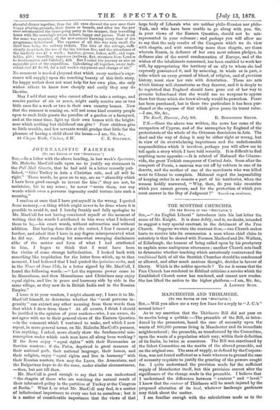JOURNALISTIC FAIRNESS.
[TO THE EDITOR OF THE "SPECTATOR."] SIR,—In a letter with the above heading, in last week's Spectator, Mr. Malcolm MacColl calls upon me to justify my statement in the Pall Mall Gazette, that he had said in a letter recently pub- lished, " Give Turkey in Asia a Christian rule, and all will be right." These words, he goes on to say, are an " absurdity which I have been good enough to invent for him ;" they are not, he maintains, his in any sense ; he never "wrote them, nor any words which even a perverse ingenuity could torture into such a meaning."
I confess at once that I have put myself in the wrong. I quoted from memory,—a thing which ought never to be done where it is possible to avoid it, and I hereby frankly and fully apologise to Mr. MacColl for not having convinced myself at the moment of writing that the words I attributed to him were what I believed I them to be,—his exact words, without subtraction and without 1 addition. But having done this at the outset, I fear I cannot go further, and admit that I have in any degree misrepresented what he did say. After reading his somewhat sweeping disclaimers alike of the matter and form of what I had attributed to him, I began to think that I must have been the victim of some strange hallucination. I looked back with something like trepidation for the letter from which, up to that moment, I had believed that I had quoted the ipsizsima verba, and in the Times of June 17th, in a letter signed by Mr. MacColl, I found the following words :—" Let the supreme power cease to be Mussulman, and then Mussulmans and Christians may enjoy equal rights, and live in peace and harmony side by side in the same village, as they now do in British India and in the Russian Empire."
I leave it to your readers, I might almost say, I leave it to Mr. MacColl himself, to determine whether the "most perverse in- genuity" can extract any other meaning from these words than that which I drew from them ? At all events, I think I should be justified in the opinion of your readers—who, I am aware, do not agree with me in their general views of the Eastern Question —in the comment which I ventured to make, and which I now repeat, in more general terms, on Mr. Malcolm MacColl's panacea. Can anything, I asked, more clearly show the fundamental mis- conception under which such men have all along been working ? If the Jews enjoy " equal rights" with their Roumanian or Servian masters ; if the Poles, deprived in great measure of their national garb, their national language, their homes, and their religion, enjoy " equal rights and live in harmony" with their Russian masters, then may the Lazes, the Armenians, and the Bulgarians hope to do the same, under similar circumstances, —then, but not till then.
Mr. MacColl is good enough to say that he can understand " the chagrin of those who are watching the natural result of their infatuated policy in the partition of Turkey at the Congress at Berlin." What I, or what Mr. MacColl may feel, is a matter of infinitesimal importance to every one but to ourselves ; but it is a matter of considerable importance that the views of that large body of Liberals who are neither philo-Russian nor philo. Turk, and who have been unable to go along with you, Sir, in your views of the Eastern Question, should not be mis- represented in your columns ; and perhaps you will allow me to say that the only results of the Congress which we do view with chagrin, and with something more than chagrin, are those wherein Russia, in defiance of her own most solemn pledges, in defiance also of the moral condemnation of Europe, and of the wishes of the inhabitants concerned, has been enabled to work her will, by appropriating the territory of an ally to whom she had expressly guaranteed it, and by annexing, in whole or in part, a tribe which on every ground of blood, of religion, and of previous history, must view her rule with detestation. These are acts which history will characterise as they deserve, and it is deeply to be regretted that England should have gone out of her way to promise beforehand that she would use no weapons to oppose them but those which she knew already would be powerless. Peace has been purchased, but in these two particulars it has been pur- chased at the expense of that which gives peace its truest value. —I am, Sir, &c., P.S.—Since the above was written, the news has come of the occupation of Cyprus, and of the assumption by England of the protectorate of the whole of the Ottoman dominions in Asia. The deed and the way of doing it may be either right or wrong, but in view of its overwhelming importance and the unfathomabre responsibilities which it involves, perhaps you will allow me to tell again a story which I have told recently. It is difficult to find anything more apposite :—It is related of Mahmud the Ghazne- vide, the great Turkish conqueror of Central Asia. Soon after the conquest of Persia, a caravan was cut off by robbers in one of its deserts, and the mother of one of the merchants who was killed went to Ghazni to complain. Mahmud urged the impossibility of keeping order in so remote a part of his territories, when the woman boldly answered, " Why, then, do you take countries which you cannot govern, and for the protection of which you must answer in the Day of Judgment ?" (1)4nioD.rra tromkrotat.


































 Previous page
Previous page